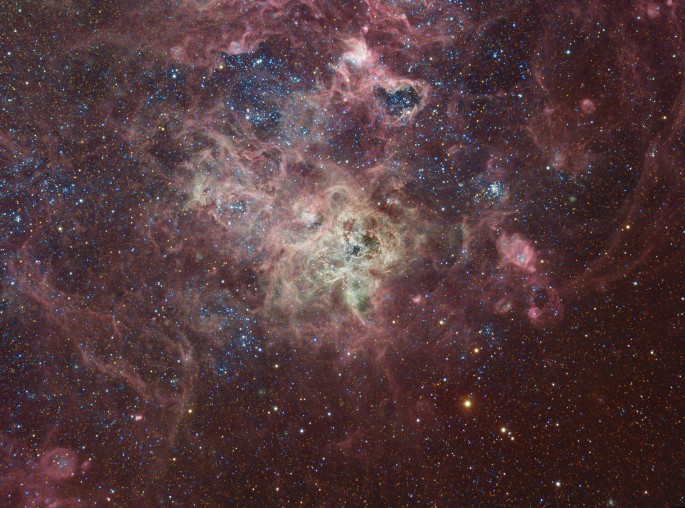Credit & Copyright: Brad Moore
Explanation:
First
cataloged as a star, 30 Doradus is actually an
immense star forming region in nearby galaxy
The Large Magellanic Cloud.
The region's spidery appearance is responsible for its popular name,
the Tarantula
Nebula, except that this tarantula is about
1,000 light-years across, and 180,000 light-years away in
the southern constellation
Dorado.
If the Tarantual Nebula were at the distance of the
Orion Nebula
(1,500 light-years), the nearest stellar nursery to Earth, it
would appear to cover about 30 degrees
on the sky or 60 full moons.
The spindly arms of the
Tarantula Nebula surround
NGC 2070, a cluster
that contains some of the intrinsically brightest,
most massive stars known.
Intriguing details of the nebula's core can be seen in
this
remarkable skyscape, a composite
of 31 hours of exposure time.
This cosmic Tarantula
also lies near the site of the closest
recent supernova.
1999 2000 2001 2002 2003 2004 2005 2006 2007 2008 2009 2010 2011 2012 2013 2014 2015 2016 2017 2018 2019 2020 2021 2022 2023 2024 2025 |
Yanvar' Fevral' Mart Aprel' Mai Iyun' Iyul' Avgust Sentyabr' Oktyabr' Noyabr' Dekabr' |
NASA Web Site Statements, Warnings, and Disclaimers
NASA Official: Jay Norris. Specific rights apply.
A service of: LHEA at NASA / GSFC
& Michigan Tech. U.
|
Publikacii s klyuchevymi slovami:
star cluster - star formation - 30 Doradus - LMC - Zolotaya Ryba - zvezdoobrazovanie - Oblasti zvezdoobrazovaniya - Tumannost' Tarantul - zvezdnoe skoplenie
Publikacii so slovami: star cluster - star formation - 30 Doradus - LMC - Zolotaya Ryba - zvezdoobrazovanie - Oblasti zvezdoobrazovaniya - Tumannost' Tarantul - zvezdnoe skoplenie | |
Sm. takzhe:
Vse publikacii na tu zhe temu >> | |
